when,while,as的区别
英语语法:when, while, as的用法的区别
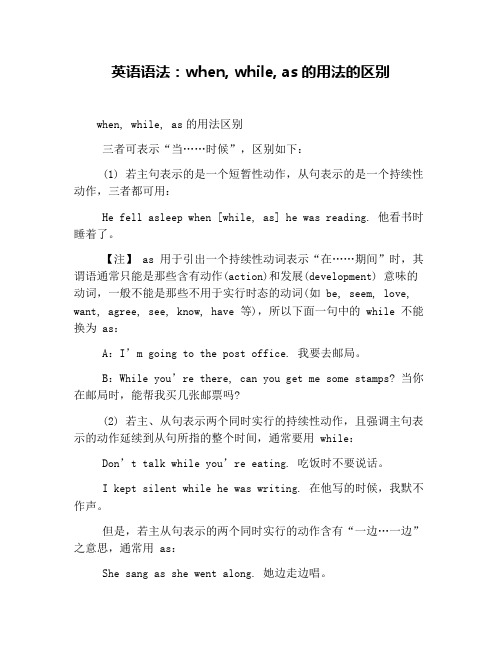
英语语法:when, while, as的用法的区别when, while, as的用法区别三者可表示“当……时候”,区别如下:(1) 若主句表示的是一个短暂性动作,从句表示的是一个持续性动作,三者都可用:He fell asleep when [while, as] he was reading. 他看书时睡着了。
【注】 as 用于引出一个持续性动词表示“在……期间”时,其谓语通常只能是那些含有动作(action)和发展(development) 意味的动词,一般不能是那些不用于实行时态的动词(如 be, seem, love, want, agree, see, know, have 等),所以下面一句中的 while 不能换为 as:A:I’m going to the post office. 我要去邮局。
B:While you’re there, can you get me some stamps? 当你在邮局时,能帮我买几张邮票吗?(2) 若主、从句表示两个同时实行的持续性动作,且强调主句表示的动作延续到从句所指的整个时间,通常要用 while:Don’t talk while you’re eating. 吃饭时不要说话。
I kept silent while he was writing. 在他写的时候,我默不作声。
但是,若主从句表示的两个同时实行的动作含有“一边…一边”之意思,通常用 as:She sang as she went along. 她边走边唱。
(3) 若从句是一个短暂性动作,主句是一个持续性动作,可用as / when 但不用 while:It was raining hard when [as] we arrived. 我们到达时正下着大雨。
(4) 若主从句表示的是两个同时(或几乎同时)发生的短暂性动作,用 as / when:I thought of it just when [as] you opened your mouth. 就在你要说的时候,我也想到了。
when,while,as引导时间状语从句的区别
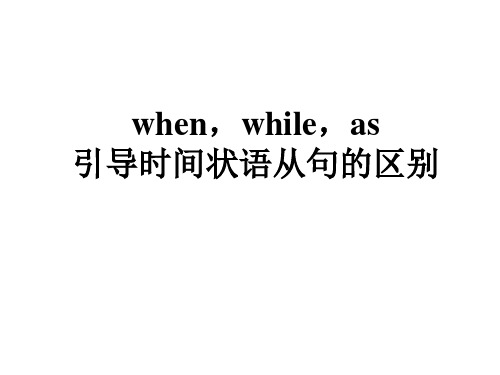
随着高度的增加,大气越来越稀薄。
③As years go by,China is getting stronger and richer.
②When /While /As she was making a phonecall,I was writing a letter. (make为延续性动词)当她在打电话时, 我正在写信。
3.当主句、从句动作同时进行,从句动 作的时间概念淡化,而主要表示主句动作 发生的背景或条件时,只能用 as。这时, as常表示“随着……”;“一边……,一 边……”之意。
随着时间一年一年过去,中国变得越
来越富强了。
④The little girls sang as they went. 小姑娘们一边走,一边唱。
4.在将来时从句中,常用when,且从 句须用一般时代替将来时。
①When the manager comes here for a visit next week,I’ll talk with him about this. 下周,经理来这参观时,我会和他谈谈此 事。
②When I got to the airport,the guests had left. (got to后发生)当我赶到飞机场时,客人 们已经离开了。
2.从句动作和主句动作同时发生,且从句 动作为延续性动词时,when,while,as都 可使用。
①When /While /As we were dancing,a stranger came in. (dance为延续性动词)当我们跳舞时,一 位陌生人走了进来。
when和while和as的区别口诀
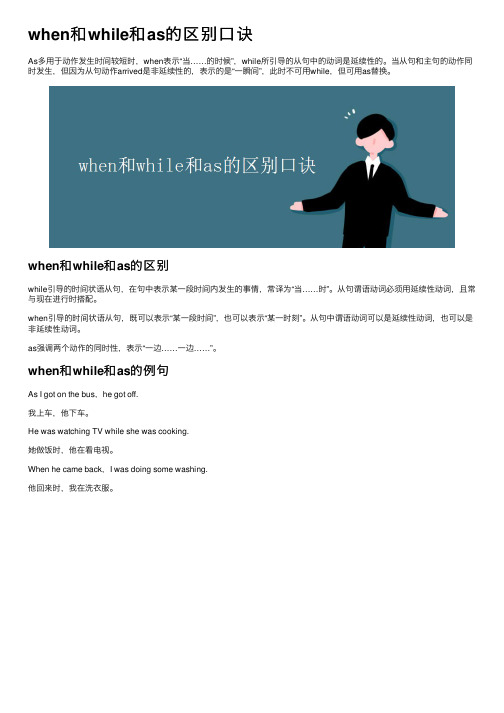
when和while和as的区别⼝诀
As多⽤于动作发⽣时间较短时,when表⽰“当……的时候”,while所引导的从句中的动词是延续性的。
当从句和主句的动作同时发⽣,但因为从句动作arrived是⾮延续性的,表⽰的是“⼀瞬间”,此时不可⽤while,但可⽤as替换。
when和while和as的区别
while引导的时间状语从句,在句中表⽰某⼀段时间内发⽣的事情,常译为“当……时”。
从句谓语动词必须⽤延续性动词,且常与现在进⾏时搭配。
when引导的时间状语从句,既可以表⽰“某⼀段时间”,也可以表⽰“某⼀时刻”。
从句中谓语动词可以是延续性动词,也可以是⾮延续性动词。
as强调两个动作的同时性,表⽰“⼀边……⼀边……”。
when和while和as的例句
As I got on the bus,he got off.
我上车,他下车。
He was watching TV while she was cooking.
她做饭时,他在看电视。
When he came back,I was doing some washing.
他回来时,我在洗⾐服。
When,While,As引导时间状语从句的区别
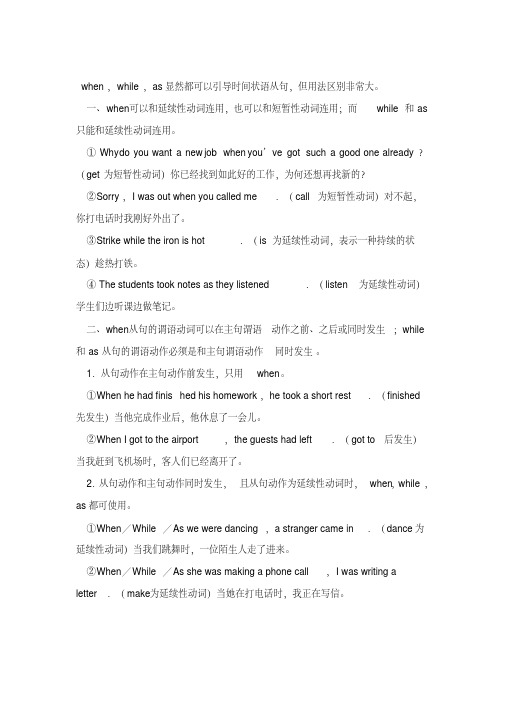
when,while,as显然都可以引导时间状语从句,但用法区别非常大。
一、when可以和延续性动词连用,也可以和短暂性动词连用;而while和as 只能和延续性动词连用。
① Why d o you want a new job when you’ve got such a good one already?(get为短暂性动词)你已经找到如此好的工作,为何还想再找新的?②Sorry,I was out when you called me.(call为短暂性动词)对不起,你打电话时我刚好外出了。
③Strike while the iron is hot.(is为延续性动词,表示一种持续的状态)趁热打铁。
④ The students took notes as they listened.(listen为延续性动词)学生们边听课边做笔记。
二、when从句的谓语动词可以在主句谓语动作之前、之后或同时发生;while 和as从句的谓语动作必须是和主句谓语动作同时发生。
1.从句动作在主句动作前发生,只用 when。
①When he had finis hed his homework,he took a short rest.(finished先发生)当他完成作业后,他休息了一会儿。
②When I got to the airport,the guests had left.(got to后发生)当我赶到飞机场时,客人们已经离开了。
2.从句动作和主句动作同时发生,且从句动作为延续性动词时,when,while,as都可使用。
①When /While /As we were dancing,a stranger came in.(dance为延续性动词)当我们跳舞时,一位陌生人走了进来。
②When /While /As she was making a phone call,I was writing a letter.(make为延续性动词)当她在打电话时,我正在写信。
When,While,As引导时间状语从句的区别

When,While,As引导时间状语从句的区别when,while,as显然都可以引导时间状语从句,但用法区别非常大。
一、when可以和延续性动词连用,也可以和短暂性动词连用;而while和as 只能和延续性动词连用。
① Why do you want a new job when you’ve got such a good one already?(get为短暂性动词)你已经找到如此好的工作,为何还想再找新的?②Sorry,I was out when you called me.(call为短暂性动词)对不起,你打电话时我刚好外出了。
③Strike while the iron is hot.(is为延续性动词,表示一种持续的状态)趁热打铁。
④ The students took notes as they listened.(listen为延续性动词)学生们边听课边做笔记。
二、when从句的谓语动词可以在主句谓语动作之前、之后或同时发生;while 和as从句的谓语动作必须是和主句谓语动作同时发生。
1.从句动作在主句动作前发生,只用 when。
①When he had finished his homework,he took a short rest.(finished 先发生)当他完成作业后,他休息了一会儿。
②When I got to the airport,the guests had left.(got to后发生)当我赶到飞机场时,客人们已经离开了。
2.从句动作和主句动作同时发生,且从句动作为延续性动词时,when,while,as都可使用。
①When /While /As we were dancing,a stranger came in.(dance为延续性动词)当我们跳舞时,一位陌生人走了进来。
②When /While /As she was making a phone call,I was writing a letter.(make为延续性动词)当她在打电话时,我正在写信。
WhenWhileAs引导时间状语从句的区别
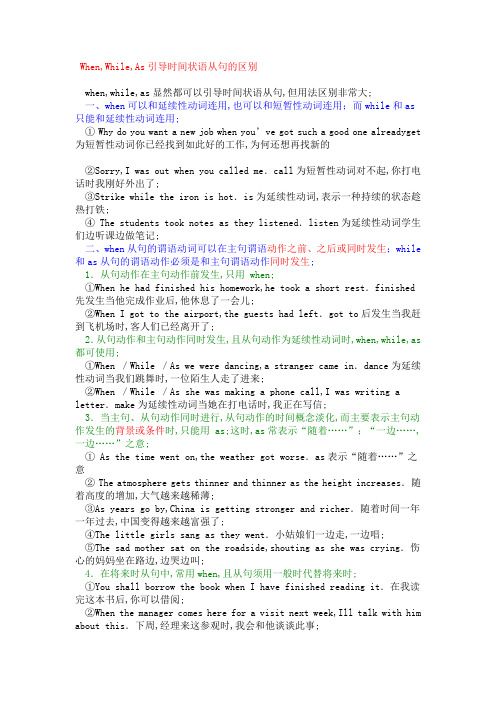
When,While,As引导时间状语从句的区别when,while,as显然都可以引导时间状语从句,但用法区别非常大;一、when可以和延续性动词连用,也可以和短暂性动词连用;而while和as 只能和延续性动词连用;① Why do you want a new job when you’ve got such a good one alreadyget 为短暂性动词你已经找到如此好的工作,为何还想再找新的②Sorry,I was out when you called me.call为短暂性动词对不起,你打电话时我刚好外出了;③Strike while the iron is hot.is为延续性动词,表示一种持续的状态趁热打铁;④ The students took notes as they listened.listen为延续性动词学生们边听课边做笔记;二、when从句的谓语动词可以在主句谓语动作之前、之后或同时发生;while 和as从句的谓语动作必须是和主句谓语动作同时发生;1.从句动作在主句动作前发生,只用 when;①When he had finished his homework,he took a short rest.finished 先发生当他完成作业后,他休息了一会儿;②When I got to the airport,the guests had left.got to后发生当我赶到飞机场时,客人们已经离开了;2.从句动作和主句动作同时发生,且从句动作为延续性动词时,when,while,as 都可使用;①When /While /As we were dancing,a stranger came in.dance为延续性动词当我们跳舞时,一位陌生人走了进来;②When /While /As she was making a phone call,I was writing a letter.make为延续性动词当她在打电话时,我正在写信;3.当主句、从句动作同时进行,从句动作的时间概念淡化,而主要表示主句动作发生的背景或条件时,只能用 as;这时,as常表示“随着……”;“一边……,一边……”之意;① As the time went on,the weath er got worse.as表示“随着……”之意② The atmosphere gets thinner and thinner as the height increases.随着高度的增加,大气越来越稀薄;③As years go by,China is getting stronger and richer.随着时间一年一年过去,中国变得越来越富强了;④The little girls sang as they went.小姑娘们一边走,一边唱;⑤The sad m other sat on the roadside,shouting as she was crying.伤心的妈妈坐在路边,边哭边叫;4.在将来时从句中,常用when,且从句须用一般时代替将来时;①You shall borrow the book when I have finished reading it.在我读完这本书后,你可以借阅;②When the manager comes here for a visit next week,Ill talk with him about this.下周,经理来这参观时,我会和他谈谈此事;三、when用于表示“一……就……”的句型中指过去的事情;sb.had hardly=scarcely done sth.when...=Hardly / Scarcely had sb.done sth.when...①I had hardly /scarcely closed my eyes when someone knocked at the door.=Hardly / Scarcely had I closed my eyes when someone knocked at the door.我刚一闭上眼,就有人在敲门了;②I had hardly /scarcely entered my room when the telephone rang.=Hardly /Scarcely had I entered my room when the telephone rang.我刚一走进房门,电话就响了;When\while\as的区别①when是at or during the time that, 既指时间点,也可指一段时间;while是during the time that,只指一段时间,因此when引导的时间状语从句中的动词可以是终止性动词,也可以是延续性动词,而while从句中的动词必须是延续性动词;②when说明从句的动作和主句的动作可以是同时,也可以是先后发生;while 则强调主句的动作在从句动作的发生的过程中或主从句两个动作同时发生;③由when引导的时间状语从句,主句用过去进行时,从句应用一般过去时;如果从句和主句的动作同时发生,两句都用过去进行时的时候,多用while引导,如:a. When the teacher came in, we were talking.当此句改变主从句的位置时,则为:While we were talking, the teacher came in.b. They were singing while we were dancing.④when和while 还可作并列连词;when表示“在那时”;while表示“而,却”,表对照关系;如:a. The children were running to move the bag of rice when they heard the sound of a motor bike.孩子们正要跑过去搬开那袋米,这时他们听到了摩托车的声音;b. He is strong while his brother is weak.他长得很结实,而他弟弟却很瘦弱;具体你可以参考这一段;。
初三必看:as、when和while的区别

初三必看:as、when和while的区别
Ⅰas “当(在)……时候”往往可与when
或while通用,但它着重指主句和从句的动作或事情相并发生。
如:
① I saw him as he was getting off the bus. 当下公共汽车的时候,我看见了他。
② As he walked on, he felt himself getting more and more
tired.他继续往前走的时候,感到越来越疲乏。
Ⅱwhen
“当(在)……的时候”主句和从句的动作或事情可以同时发生,也可以先后发生。
① It was raining when we arrived. 当我们到达的时候,正下着雨。
② When we were at school, we went to the library every day.
我们在求学的时候,每天都到图书馆去。
Ⅲwhile
“当(在)……的时候”表主句的动作或事情发生在从句中的动作或事情的进展过程之中。
从句通常为进行时态。
它有时可与when通用,但它只能指一段时间(a period of time),而不能指一点时间(a point of time)如上面的第一个例子。
又如:
① Please don’t talk so loud while others are working.
别人在工作的时候,请勿大声讲话。
② While I am washing the floor, you can be cleaning the
windows.我洗地板时,你可以擦窗户。
when as while用法区别

when as while 用法区别,各自意思hen,while,as引导时间状语从句的区别when,while,as显然都可以引导时间状语从句,但用法区别非常大。
一、when可以和延续性动词连用,也可以和短暂性动词连用;而while和as只能和延续性动词连用。
①Why do you want a new job when youve got such a good one already?(get为短暂性动词)你已经找到如此好的工作,为何还想再找新的?②Sorry,I was out when you called me.(call为短暂性动词)对不起,你打电话时我刚好外出了。
③Strike while the iron is hot.(is为延续性动词,表示一种持续的状态)趁热打铁。
④The students took notes as they listened.(listen为延续性动词)学生们边听课边做笔记。
二、when从句的谓语动词可以在主句谓语动作之前、之后或同时发生;while和as从句的谓语动作必须是和主句谓语动作同时发生。
1.从句动作在主句动作前发生,只用when。
①When he had finished his homework,he took a short rest.(finished先发生)当他完成作业后,他休息了一会儿。
②When I got to the airport,the guests had left.(got to后发生)当我赶到飞机场时,客人们已经离开了。
2.从句动作和主句动作同时发生,且从句动作为延续性动词时,when,while,as都可使用。
①When /While /As we were dancing,a stranger came in.(dance为延续性动词)当我们跳舞时,一位陌生人走了进来。
②When /While /As she was making a phonecall,I was writing a letter.(make为延续性动词)当她在打电话时,我正在写信。
- 1、下载文档前请自行甄别文档内容的完整性,平台不提供额外的编辑、内容补充、找答案等附加服务。
- 2、"仅部分预览"的文档,不可在线预览部分如存在完整性等问题,可反馈申请退款(可完整预览的文档不适用该条件!)。
- 3、如文档侵犯您的权益,请联系客服反馈,我们会尽快为您处理(人工客服工作时间:9:00-18:30)。
一、根据从句动作的持续性来区分1.“主短从长”型:即主句是一个短暂性的动作,而从句是一个持续性动作,此时三者都可用。
如:Jim hurt his arm while [when, as] he was playing tennis. 吉姆打网球时把手臂扭了。
As [When, While] she was waiting for the train, she became very impatient. 她在等火车时,变得很不耐烦。
注意:as用于引出一个持续性动词表示“在……期间”时,其谓语通常只能是那些含有动作和发展意味的动词,一般不能是那些不用于进行时态的动词(如be, seem, love, want, agree, see, know, have 等),所以下面一句中的while不能换为as:A:I’m going to the post office. 我要去邮局。
B:While you are there, can you get me some stamps? 当你在邮局时,能帮我买几张邮票吗?若主句与从句表示的是两个几乎同时发生的动作,含有类似汉语“刚要……就”“正要……却”的意思,英语一般要用as(也可用when),且此时通常连用副词just。
且此时,从句一般用进行时,主句用短暂性动词的一般时态。
【注意与六区别】I caught him just when [as] he was leaving the building. 他正要离开大楼的时候,我把他截住了。
Just as [when] the two men were leaving, a message arrived. 就在这两个人要离开的时候,突然有了消息。
2.“主长从长”型:即主句和从句为两个同时进行的动作或存在的状态,且强调主句动作或状态延续到从句所指的整个时间,此时通常要用while。
如:I always listen to the radio while I’m driving. 我总是一边开车一边听收音机。
He didn’t ask me in; he kept me standing at the door while he read the message. 他没有让我进去,他只顾看那张条子,让我站在门口等着。
但是,若主句和从句所表示的两个同时进行的动作含有“一边……一边”之意时,则习惯上要用as。
如:He swung his arms as he walked. 他走路时摆动着手臂。
I couldn’t remember a story to tell the children, so I made one up as I went along. 我想不出有什么故事可给孩子讲了,只好现编现讲。
3.“主长从短”型:即主句是一个持续性动作,而从句是一个短暂性动作,此时可以用a s或when,但不能用while。
如:It was raining hard when [as] we arrived. 我们到达时正下着大雨。
When [As] he came in, I was listening to the radio. 他进来时,我在听收音机。
4.“主短从短”型:若主句与从句表示的是两个同时发生的短暂性动作,含有类似汉语“一……就”的意思,英语一般要用as (也可用when)。
如:The ice cracked as [when] I stepped onto it. 我一踩冰就裂了。
He jumped to his feet as the boss came in. 老板一进来他立刻站了起来。
但是,在hardly/scarcely/rarely。
when。
句型中,只能用when。
表示“一……就……”(指过去的事情)。
sb.had hardly/scarcely/rarely done sth.when...=Hardly /Scarcely/Rarely had sb.done sth.when...I had hardly/scarcely/rarely closed my eyes when someone knocked at the door.=Hardly /Scarcely/Rarely had I closed my eyes when someone knocked at the door.我刚一闭上眼,就有人在敲门了。
I had hardly/scarcely/rarely entered my room when the telephone rang.=Hardly /Scarcely/Rarely had I entered my room when the telephone rang.我刚一走进房门,电话就响了。
二、根据主句与从句动作是否同时发生来区分when从句的谓语动词可以在主句谓语动作之前、之后或同时发生;while和as从句的谓语动作必须是和主句谓语动作同时发生。
When he had finished his homework,he took a short rest.(从句动作在主句前)当他完成作业后,他休息了一会儿。
When I got to the airport,the guests had left.(从句动作在主句后)当我赶到飞机场时,客人们已经离开了。
When he arrives he’ll tell us all about the match. 等他到了,他会好好给我们讲讲那场比赛的情况。
When she had finished she waited as though for a reply. 她讲完之后等了等,仿佛是在等候回答似的。
三、根据是否具有伴随变化来区分若要表示主句动作伴随从句动作同时发展变化,有类似汉语“随着”的意思,英语习惯上要用as,而不用when或while。
如:The room grew colder as the fire burnt down. 随着炉火逐渐减弱,房间越来越冷。
As time goes by my memory seems to get worse. 随着时间的流逝,我的记忆力似乎越来越差。
注:若不是引导从句,而是引出一个短语,则用with,不用as。
如:With winter coming on, it’s time to buy warm clothes. 随着冬天到来,该买暖和衣裳了。
The shadows lengthened with the approach of sunset. 随着太阳下落,影子也逐渐伸长。
四、根据从句动作的规律性来区分若暗示一种规律性,表示“每当……的时候”,指"每一次",英语一般要用when。
When I turn on the TV, smoke comes out the back.每当我打开电视,就有烟从后面冒出.It’s cold when it snows. 下雪时天冷。
He smiles when you praise him. 你夸奖他时他总是笑笑。
五、根据是否具有“趁机”意味来区分若从句所表示的“当……的时候”具有“趁机”的意味,则通常用while。
如:Strike while the iron is hot. 趁热打铁。
I tried to slip the note to him while the teacher wasn’t looking. 我想趁老师不注意时把条子偷偷递给他。
有时也用when。
如:He stole the money when no one was by. 他趁旁边无人时把钱偷走了。
The boy looks at her repeatedly when she’s not looking. 那男孩趁她没看他的时候不断地盯着她看。
六、根据是否用作并列连词来区分when可用作并列连词,表示“在这时(突然)”;while也可以用作并列连词,表示“而”“却”(表示对比);但as则没有类似用法。
如:I was just about to go to bed when I heard a knock on the door. 我正要睡觉,听见有人敲门。
The children were running to move the bag of rice when they heard the sound of a motor bike.孩子们正要跑过去搬开那袋米,在这时他们听到了摩托车的声音。
We were dancing,when a stranger came in.我们正在跳舞,在这时突然一位陌生人走了进来。
One person may like to spend his vacation at the seashore, while another may prefer the mountains. 一个人会喜欢在海滨度假,而另一个人会喜欢在山里度假。
七、根据所引出的省略句来区分1.as和when之后均可直接跟一个名词,构成省略句;但是while一般不这样用。
如:As [When] a boy, he lived in Japan. 他小时候在日本。
As [When] still a student, he wrote a novel. 当他还是个学生的时候,他就写了一本小说。
2.when和while之后可接现在分词、介词短语、形容词等构成省略句,但as一般不这样用。
如:When [While] reading, he fell asleep. 他看书时睡着了。
When [While] in trouble, ask her for help. 遇到麻烦的时候你就去找她帮忙。
You must study hard while (you are) young, or you will regret when (you are) old. 你趁年轻时必须努力学习,不然到老了你会后悔的。
